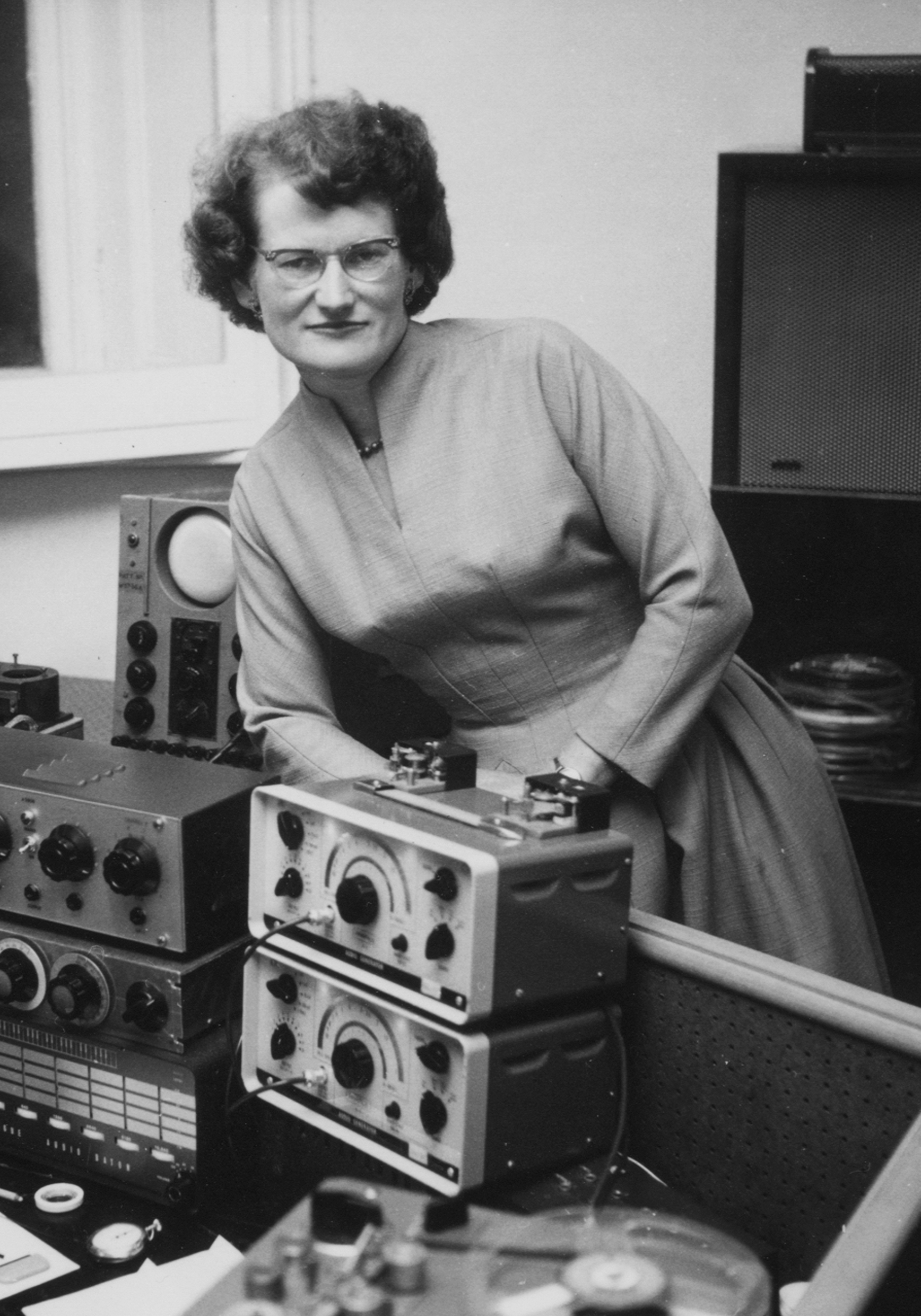Difference between revisions of "Daphne Oram (Q31731)"
From CanonBase
(Created claim: Internal image (P24): Daphne_Oram.jpg) | (Removed claim: Instance of (P1): Women and technology (Theme) (Q31714), #quickstatements; #temporary_batch_1694073319027) | ||
| (4 intermediate revisions by 2 users not shown) | |||
| Property / Instance of | |||
| - | |||
| Property / Instance of: Women and technology (Theme) / rank | |||
| - | |||
| Property / context | |||
| + | British composer and inventor Daphne Oram (Born 31 December 1925) was aged 18 and armed with a passion for sound, music and electronics when she started work at the BBC as a sound engineer. With many of her country’s men serving in the second World War, she began her career in radio broadcasting in the early ‘40s. Galvanized by the ongoing developments in audio technology, she devoted much of her free time to exploring new ways to make sounds with electronics. One of the founding figures of the BBC’s Radiophonic Workshop, she was one of the earliest British composers to produce electronic sounds and compose from field recordings – Musique Concrete, the ancestry of today’s electronic music. In 1959 she opened her own Oramics Studios for Electronic Composition dedicated to the drawn sound technique she would spend her life developing. (English) | ||
| Property / context: British composer and inventor Daphne Oram (Born 31 December 1925) was aged 18 and armed with a passion for sound, music and electronics when she started work at the BBC as a sound engineer. With many of her country’s men serving in the second World War, she began her career in radio broadcasting in the early ‘40s. Galvanized by the ongoing developments in audio technology, she devoted much of her free time to exploring new ways to make sounds with electronics. One of the founding figures of the BBC’s Radiophonic Workshop, she was one of the earliest British composers to produce electronic sounds and compose from field recordings – Musique Concrete, the ancestry of today’s electronic music. In 1959 she opened her own Oramics Studios for Electronic Composition dedicated to the drawn sound technique she would spend her life developing. (English) / rank | |||
| + | Normal rank | ||
| Property / context: British composer and inventor Daphne Oram (Born 31 December 1925) was aged 18 and armed with a passion for sound, music and electronics when she started work at the BBC as a sound engineer. With many of her country’s men serving in the second World War, she began her career in radio broadcasting in the early ‘40s. Galvanized by the ongoing developments in audio technology, she devoted much of her free time to exploring new ways to make sounds with electronics. One of the founding figures of the BBC’s Radiophonic Workshop, she was one of the earliest British composers to produce electronic sounds and compose from field recordings – Musique Concrete, the ancestry of today’s electronic music. In 1959 she opened her own Oramics Studios for Electronic Composition dedicated to the drawn sound technique she would spend her life developing. (English) / qualifier | |||
| + | |||
| Property / Source URL | |||
| + | |||
| Property / Source URL: https://www.bbc.com/historyofthebbc/100-voices/pioneering-women/women-of-the-workshop/ / rank | |||
| + | Normal rank | ||
| Property / Source URL | |||
| + | |||
| Property / Source URL: https://en.wikipedia.org/wiki/Oramics / rank | |||
| + | Normal rank | ||
| Property / is used in theme | |||
| + | |||
| Property / is used in theme: Women and technology (Theme) / rank | |||
| + | Normal rank | ||
Latest revision as of 07:55, 7 September 2023
pioneer of electronic music
| Language | Label | Description | Also known as |
|---|---|---|---|
| English | Daphne Oram | pioneer of electronic music |
Statements
31 December 1925Gregorian
0 references
5 January 2003
0 references
British composer and inventor Daphne Oram (Born 31 December 1925) was aged 18 and armed with a passion for sound, music and electronics when she started work at the BBC as a sound engineer. With many of her country’s men serving in the second World War, she began her career in radio broadcasting in the early ‘40s. Galvanized by the ongoing developments in audio technology, she devoted much of her free time to exploring new ways to make sounds with electronics. One of the founding figures of the BBC’s Radiophonic Workshop, she was one of the earliest British composers to produce electronic sounds and compose from field recordings – Musique Concrete, the ancestry of today’s electronic music. In 1959 she opened her own Oramics Studios for Electronic Composition dedicated to the drawn sound technique she would spend her life developing. (English)
0 references
